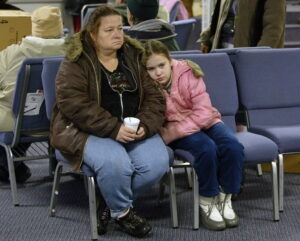- Why Families Need More Financial Support during the COVID-19 PandemicDespite the important temporary relief provided to many families by the March 2020 CARES Act, millions of American families are experiencing financial hardship as we enter the new year.
- Stephanie Coontz Weighs In On Ivanka Trump’s Defense of Paid Family LeaveIn a letter to The Wall Street Journal, Ivanka Trump defended the Trump administration’s proposed family leave program, stating that it is not an “entitlement” program, but an “investment” in… Read more: Stephanie Coontz Weighs In On Ivanka Trump’s Defense of Paid Family Leave
- The Frontlines of Welfare Reform: Why Marriage and Responsible Fatherhood Programs Succeed or FailThe Frontlines of Welfare Reform: Why Marriage and Responsible Fatherhood Programs Succeed or Fail A briefing paper prepared for the Council on Contemporary Families by Jennifer Randles, Assistant Professor of… Read more: The Frontlines of Welfare Reform: Why Marriage and Responsible Fatherhood Programs Succeed or Fail
- Is TANF Working for Struggling Millennial Parents?A briefing paper prepared for the Council on Contemporary Families by Shawn Fremstad, JD, Senior Fellow at the Center for American Progress and Senior Research Associate at the Center for… Read more: Is TANF Working for Struggling Millennial Parents?
- Welfare Reform’s 20th AnniversaryWelfare Reform’s 20th Anniversary A briefing paper prepared for the Council on Contemporary Families by Stephanie Coontz, Professor of History and Family Studies, The Evergreen State College August 22, 2016… Read more: Welfare Reform’s 20th Anniversary
- Welfare Reform at 20. How’s that working for you?Welfare Reform at 20. How’s that working? Overview of the Welfare Reform at 20 Online Symposium prepared for Council on Contemporary Families by symposium editor Virginia Rutter, Professor of Sociology,… Read more: Welfare Reform at 20. How’s that working for you?
- Welfare Reform Attitudes and Single Mothers’ Employment after 20 YearsWelfare Reform Attitudes and Single Mothers’ Employment after 20 Years A briefing paper prepared for the Council on Contemporary Families by Philip Cohen, Professor of Sociology, University of Maryland. August… Read more: Welfare Reform Attitudes and Single Mothers’ Employment after 20 Years
- TANF Policy to Address Low, Volatile Income among Disadvantaged FamiliesA briefing paper prepared for Council on Contemporary Families by Bradley Hardy, Assistant Professor of Public Administration and Policy, American University. August 22, 2016 On the 20th anniversary of Welfare… Read more: TANF Policy to Address Low, Volatile Income among Disadvantaged Families
- TANF didn’t fight poverty. Full employment did.A briefing paper prepared for Council on Contemporary Families by Alan Barber, Director of Domestic Policy, Center for Economic and Policy Research, and Virginia Rutter, Professor of Sociology, Framingham State… Read more: TANF didn’t fight poverty. Full employment did.
- Family Diversity is the New Normal for America’s ChildrenPeople often think of social change in the lives of American children since the 1950s as a movement in one direction – from children being raised in married, male-breadwinner families to a new norm of children being raised by working mothers, many of them unmarried. Instead, we can better understand this transformation as an explosion of diversity, a fanning out from a compact center along many different pathways.
- Was the War on Poverty a Failure? Or are Anti-Poverty Efforts Simply Swimming Against a Stronger Tide?This month marks the 50th anniversary of President Lyndon B. Johnson’s declaration of an “unconditional war on poverty.” Yet this month also marks over a quarter century since President Ronald Reagan’s 1988 announcement that the war on poverty was over, and that poverty had won. In this report, University of Maryland sociologist Philip Cohen examines the many early victories, as well as the setbacks in the War on Poverty.
- Promoting marriage among single mothers: An ineffective weapon in the war on poverty?This month marks the 50th anniversary of President Lyndon B. Johnson’s declaration of an “unconditional war on poverty.” Yet this month also marks over a quarter century since President Ronald Reagan’s 1988 announcement that the war on poverty was over, and that poverty had won. Many politicians blame the resurgence of poverty on the spread of unwed motherhood and conclude that promoting marriage among low-income individuals would do more to reduce poverty than government investments. In this report, Ohio State University sociologist Kristi Williams examines how efforts to get impoverished single mothers to marry are unlikely to make much of a dent in poverty rates and may even have some harmful outcomes for mothers and children alike.
- 50th Anniversary of the War on Poverty: Have we snatched defeat from the jaws of victory?This month marks the 50th anniversary of President Lyndon B. Johnson’s declaration of an “unconditional war on poverty.” Yet this month also marks over a quarter century since President Ronald Reagan’s 1988 announcement that the war on poverty was over, and that poverty had won. To mark the anniversaries of these very different points in the government’s role in poverty reduction, two researchers from the Council on Contemporary Families assess where we have come from and where we stand today.
- Poverty, Hardship and Families: How Many People Are Poor, and What Does Being Poor in America Really Mean?MEDIA CONTACT: Virginia Rutter Associate Professor of Sociology Framingham State University Board Member, Council on Contemporary Families Email: vrutter@gmail.com Phone: 206-375-4139 Retailers report that this year’s post-Thanksgiving shopping weekend broke… Read more: Poverty, Hardship and Families: How Many People Are Poor, and What Does Being Poor in America Really Mean?
- ‘One Stroke of the Pen’: The 47-year struggle to end racial discrimination in housingForty-seven years ago, on November 20, 1962, President Kennedy signed Executive Order 11063, prohibiting federally-funded housing agencies from denying mortgages to any person based on their race, color, creed or national origin. Many strokes of many other presidents’ pens followed, including the 1964 Civil Rights Act, the 1968 Fair Housing Act, the 1975 Home Mortgage Disclosure Act, and the 1977 Community Reinvestment Act. Yet for more than 30 years after Kennedy’s order, whites were much more likely to receive home mortgage loans than blacks with the same qualifications.
- How Should We Think About the Taxpayer Consequences of Divorce?A new report, “The Taxpayer Costs of Divorce and Unwed Childbearing: First-Ever Estimates for the Nation and all 50 States”, raises the question of how much divorce costs taxpayers. This… Read more: How Should We Think About the Taxpayer Consequences of Divorce?
- It’s April 15: Do You Know Where Your Income Tax Dollars Are Going?Download Full Report as a PDF Download Full Report as a Word Document Americans tend to think we are better off than families in most other industrial countries because we… Read more: It’s April 15: Do You Know Where Your Income Tax Dollars Are Going?
- Teen Pregnancy and Poverty: 30-Year-Study Confirms That Living in Economically-Depressed Neighborhoods, Not Teen Motherhood, Perpetuates PovertyFor the past 15 years, political pundits have been telling us a dark fairy tale about American teens, blaming who have babies out of wedlock. This assumption guided the welfare reform act of 1996, which promised to write America a happy ending by getting teens to stop having babies, get married, and thus end poverty. But a new longitudinal study by Frank Furstenberg shows that fairy tales have no place in the realm of policy-making. His data reveal that teen childbearing is NOT the reason that many Americans have been trapped in poverty over the past three decades.
- Marriage, Poverty & Public PolicyAccess Full Report According to recent census figures, 6 percent of married couple families with children live in poverty, compared to 33 percent of families headed by single moms. To… Read more: Marriage, Poverty & Public Policy









